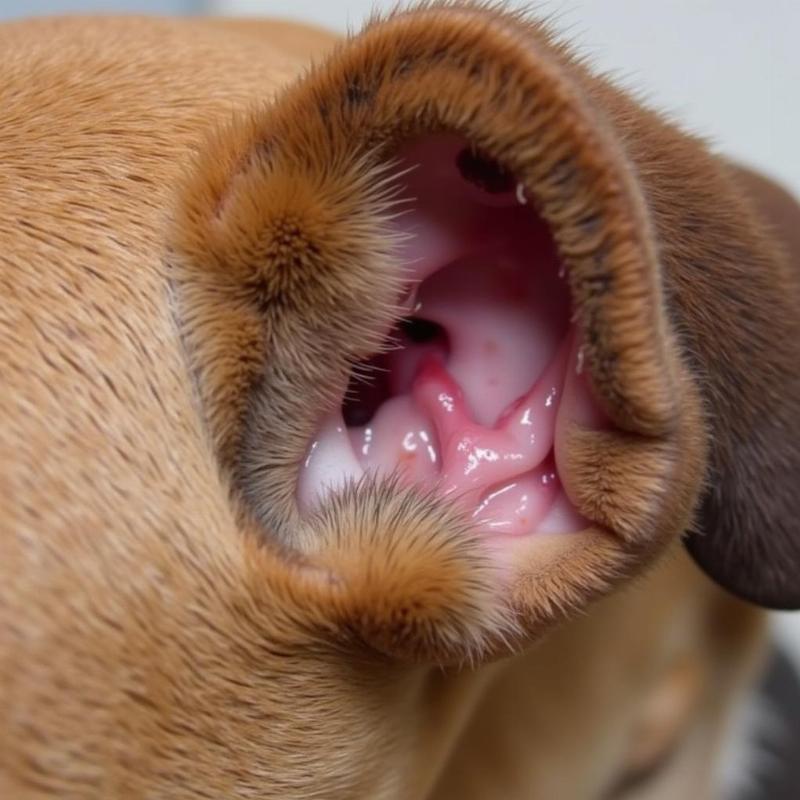Ear infections are a common ailment in dogs, often causing discomfort and distress. Understanding the causes, symptoms, and treatment options, including what “BNT” might refer to in the context of ear treatments, is crucial for every responsible dog owner. This guide will delve into various aspects of canine ear care, focusing on treatments and preventative measures to ensure your furry friend’s aural health.
Decoding “BNT” in Dog Ear Treatments
While “BNT” isn’t a standard veterinary acronym for a specific ear treatment, it likely refers to a combination therapy often prescribed by veterinarians. This might include a combination of Bacterial, Nystatin (anti-fungal), and Triacide (anti-inflammatory/anti-parasitic) medications. These are often combined into a single solution to address various types of ear infections. It’s crucial to consult with your vet to determine the exact composition of any prescribed “BNT” treatment as the specific ingredients can vary. Never attempt to self-diagnose or treat your dog’s ear issues without professional guidance.
 Dog Ear Infection Symptoms
Dog Ear Infection Symptoms
Common Causes of Canine Ear Infections
Understanding the underlying causes is key to effective treatment and prevention. Common culprits include allergies, ear mites, bacteria, yeast infections, and even foreign bodies like grass seeds. Certain breeds with floppy ears, such as Cocker Spaniels and Basset Hounds, are more prone to ear infections due to reduced airflow and increased moisture within the ear canal.
Recognizing the Signs: Symptoms of Ear Infections in Dogs
A dog with an ear infection might display a variety of symptoms. These can include:
- Head shaking or tilting
- Scratching at the ears
- Redness and swelling in the ear canal
- Unpleasant odor emanating from the ear
- Dark or yellowish discharge
- Pain or sensitivity around the ears
- Loss of balance or disorientation (in severe cases)
Veterinary Diagnosis and Treatment Options
If you suspect your dog has an ear infection, a visit to the veterinarian is essential. They will perform a thorough examination using an otoscope to visualize the ear canal and determine the underlying cause. Based on the diagnosis, they may prescribe:
- Topical medications: Ear drops or ointments containing antibiotics, antifungals, or anti-inflammatories.
- Oral medications: For more severe infections, oral antibiotics or antifungals might be necessary.
- Ear cleaning: Your vet may demonstrate proper ear cleaning techniques using a vet-approved cleanser.
- Treatment for underlying conditions: If allergies are contributing to the infection, allergy management strategies will be discussed.
Home Care and Prevention
Regular ear cleaning is crucial for preventing infections, especially in breeds predisposed to them. Use a vet-recommended ear cleaning solution and avoid cotton swabs, which can push debris further into the ear canal. Keeping your dog’s ears dry after swimming or bathing is also important.
Conclusion
Ear infections in dogs require prompt veterinary attention to prevent complications. Understanding the causes, symptoms, and treatment options, including potential “BNT” combination therapies, empowers you to provide the best care for your canine companion. Regular cleaning and preventative measures can significantly reduce the risk of future ear infections, keeping your dog’s ears healthy and happy.
FAQ
- What does “BNT” ear treatment typically contain? While not a standard acronym, “BNT” usually refers to a combination of Bacterial, Nystatin (anti-fungal), and Triacide (anti-inflammatory/anti-parasitic) medications. Always consult your vet for the exact composition.
- How can I tell if my dog has an ear infection? Look for signs like head shaking, scratching, redness, swelling, discharge, and odor from the ears.
- Can I treat my dog’s ear infection at home? No, it’s crucial to consult a veterinarian for proper diagnosis and treatment.
- How can I prevent ear infections in my dog? Regular ear cleaning with a vet-approved solution and keeping the ears dry are essential preventative measures.
- Are some dog breeds more prone to ear infections? Yes, dogs with floppy ears are more susceptible due to reduced airflow and increased moisture.
- What should I do if my dog’s ear infection doesn’t improve with treatment? Contact your veterinarian immediately, as a different approach or further investigation may be necessary.
- Can allergies cause ear infections in dogs? Yes, allergies can contribute to ear infections, so allergy management is often part of a comprehensive treatment plan.
Beautdogs.us is your premier online resource for comprehensive dog care information in the US. We offer expert advice on dog breeds, health, and lifestyle, empowering you to provide the best care for your furry friend. From breed-specific guidance to veterinary insights, Beautdogs.us is your trusted source for everything dog-related. Contact us at [email protected] or call us at +1 501-555-7529.